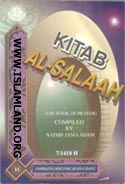Kitab Al-Salaah (The book of Prayer)

Haidh
(Menstruation)
This refers to the periodical discharge of blood by women in their
state of health and is easily distinguishable to women from
post-childbirth bleeding.
Post-Childbirth Bleeding (Nifas)
Such bleeding usually occurs to women after childbirth and may continue
without fixed duration, although in some cases, there may not occur
bleeding at all. However, on the strength of the teachings of the
Prophet (peace be upon him), a woman experiencing post-childbirth
bleeding has a maximum confinement period of about forty (40) days
after which, she is required to make Ghusl and commence her Islamic
duties. If, however, the blood does not cease after 40 days, most
scholars are of the opinion that the woman should continue with her
regular Islamic duties.
Acts Forbidden to Women Experiencing Menstruation and Post-Childbirth
Bleeding
- All acts mentioned herein before, as forbidden to persons
requiring Ghusl are also prohibited to women experiencing menstruation
and post-childbirth bleeding.- A woman cannot engage in a sexual intercourse.
The
companions of the Prophet (peace be upon him), asked him about this and
Allah (subhanahu wa ta'ala) revealed the following Qur'anic verse:“
They ask thee concerning women's courses. say- they area hurt and a
pollution.- so keep away from women in their courses, and do not
approach them until they are clean ....... ” (Qur'an 2:222).
However, all scholars are of the opinion that a husband may touch any
part of his wife's body above the navel and/or below the knees. This
fact, is based on the confirmations of the Prophet's wives, that when
the Prophet (peace be upon him) wished to be with them during their
periods, they would put something over their private parts.
